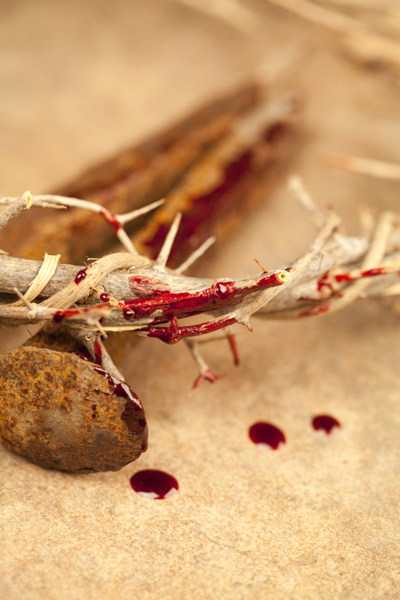So That You May Follow His Steps

For what renown is it for you if you are sinning, and then, being beaten with fists, you endure it? But if you endure, doing good and suffering for it, this is favorable with God. For you were called to this, because Messiah also suffered for you, leaving Himself to you as an example, so that you may follow His steps—He WHO DID NOT COMMIT SIN, NOR WAS UNDER-HANDEDNESS FOUND IN HIS MOUTH… who Himself BORE OUR SINS in His body upon the tree, so that having died to the sins, we may live to the righteousness… (1Keifa 2:20-24, MJLT)
As we enter into the Passover season, we celebrate not only Israel’s salvation from captivity and oppression in Egypt, but also the individual salvation that this watershed event ultimately foreshadows. During this annual time of commemorating our freedom from sin, we are presented with the unique opportunity to refocus on, recommit to, recognize, and remember what Yeshua selflessly did on our behalf, and the consummate purpose to which He has called us. Unfortunately, this high calling—which is clearly spelled out by the emissary, Keifa—is essentially foreign to and lost among today’s modern Body of Messiah.
According to Keifa, our purpose as Messiah-followers is to “do good”—it’s just not the feeding-the-poor/clothing-the-homeless type of “doing good” (although, it doesn’t call for the exclusion of such activities, either). No, when Keifa says “doing good,” he is employing this phrase in juxtaposition with “doing evil” (1Keifa 3:17), and in our immediate context, it is opposed to “sinning” (1Keifa 2:20). Therefore, “doing good” according to Keifa means to stop sinning and live righteously—but more than that, to do so especially if it involves our own discomfort, suffering or persecution.
So, it is suffering-worthy sinlessness and righteousness to which we are called. But why pursue righteousness even to the point of suffering? “Because Messiah also suffered for you, leaving Himself to you as an example, so that you may follow His steps.” If we call upon and bear the name of Yeshua, we obligate ourselves to conform to His character. Just like the One “who did not commit sin,” we too must strive toward sinlessness. Just like the One in whose mouth was found no under-handedness, we also must speak no word of deceit, but rather boldly declare the truth of God.
The Master Yeshua “bore our sins in His body upon the tree,” but not merely to show us the way to everlasting life. On the contrary, He explicitly “died to [our] sins, [so that] we may live to the righteousness.” We are not only to follow Yeshua’s steps into eternity, but during every single moment of the life we are leading today. We are to follow Yeshua’s example of “doing good”—of “liv[ing] to the righteousness”—no matter the personal cost, discomfort or danger. As Paul also confirms,
With Messiah I have been crucified, and no more do I live, but Messiah lives in me. And that which I now live in the flesh, I live in the faith of the Son of God, who loved me and gave Himself for me. (Galatians 2:20, MJLT)
The purpose of your life is to live everyday selflessly, accepting through your actions the sacrifice of the Messiah that set you free from your sins—even and especially if it means that the price to advance Messiah’s message and cause is your own life.
[You were] redeemed… with precious blood, as of a lamb unblemished and unspotted—Messiah’s! (1Keifa 1:18-19, MJLT)
Clean out, therefore, the old leaven, so that you may be a new batch of dough, because you are unleavened, for our Pesach—Messiah—also was sacrificed for us, so that we may keep the Feast, not with old leaven, nor with the leaven of evil and wickedness, but with the matzah of purity and truth. (1Corinthians 5:7-8, MJLT)
Look! the Lamb of God, who is taking away the sin of the world! (Yochanan 1:29, MJLT)
This Passover season, as you remember the sacrifice Yeshua made for you, take a good long look at how you’ve been living for Him in return. The Master left you Himself as an example… have you been following His steps?
What do you think? Share your thoughts below.
Leave a Reply
Want to join the discussion?Feel free to contribute!


Thank you so much for the teaching. What a wonderful reminder this Passover.
We are creatures of habit. If we continually reign ourselves in, we eventually get used to it. If we deny our sin nature , and try our best to live righteously, we can do it with Yeshua’s help, at least to a better degree.
It’s not easy, and if we are honest with ourselves, sometimes we just don’t feel like thinking about His sacrifice.
I am gratefull that He has made me righteous in His eyes- otherwise I’d have to beat myself up daily. It is His love that makes us worthy. It is a matter of on-going sanctification. Passover is such a holy time to reflect on Him.
We all have to learn to take a punch.